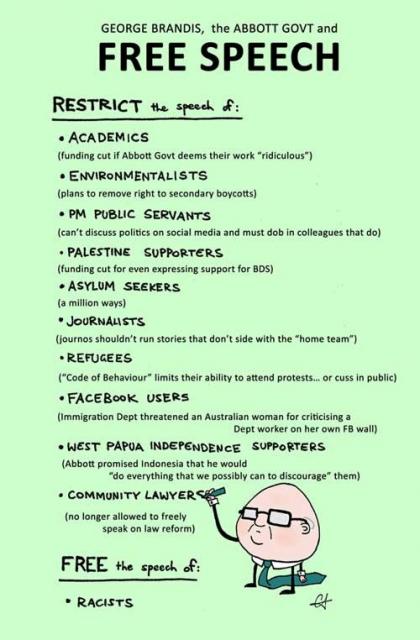Search
Recent comments
- framing....
2 hours 31 min ago - huckabee v tucker.....
2 hours 46 min ago - EU degeneration....
3 hours 34 min ago - a major war?....
5 hours 48 min ago - WAR!?....
4 hours 43 min ago - saint rube....
7 hours 29 min ago - patience....
9 hours 38 min ago - pretending....
11 hours 5 min ago - stenography.....
1 day 1 hour ago - black....
1 day 1 hour ago
Democracy Links
Member's Off-site Blogs
by george .....

- By John Richardson at 28 Jul 2014 - 12:07am
- John Richardson's blog
- Login or register to post comments
hunting witches and unions...
A couple of days ago I was leaked a document from the federal attorney-general’s department. Reading it reminded me of the old gag: “just because you're paranoid doesn’t mean they aren’t out to get you.”
As is widely reported today, all federal departments and agencies are being asked to disclose every contact with any trade union for any reason over the past decade in response to a “scoping questionnaire”.
It’s a pretty extraordinary document. For one thing, although it’s notionally about the royal commission into unions, it goes well beyond the Commission’s terms of reference and seems to imply that any consultation with unions on public policy matters, and even negotiating a workplace agreement with unions representing public servants is somehow illegitimate. In other words, two of the core roles of unions as representatives of working people are somehow inherently corrupt.
This document confirms what the ACTU has said all along: that the royal commission into trade unions is a political witch hunt. It’s more evidence of the deep contempt the government has for unions, unionists and union members.
The ACTU has today sought access to correspondence and other documentation through Freedom of Information to determine precisely what involvement the attorney-general George Brandis or the employment minister Eric Abetz have had in this process. If ministers have ordered the public service to pursue this anti-democratic frolic it’s a clear abuse of power.
The whole thing is particularly bizarre given that the royal commission has shown no interest in the public sector and doesn’t actually need any help getting information if it wants it. Perhaps the government feels the need to run a parallel royal commission because of the disappointing results from the real one they established.
It’s not like the real commission is lacking in power. It has coercive powers to collect information and to make witnesses attend hearings and give evidence. The commission is conducting “private hearings” out of the public gaze. The government has given it authority to tap phones. Many of the rules that apply in normal court proceedings don’t apply or are limited at a royal commission, including in relation to self-incrimination, legal professional privilege and the right to cross-examine witnesses.
read more: http://www.theguardian.com/commentisfree/2014/jul/28/the-royal-commission-into-trade-unions-is-a-political-witch-hunt